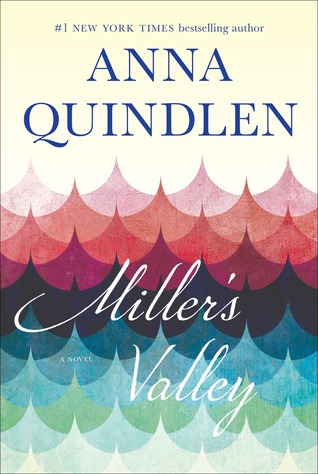I am a fan of Anna Quindlen’s work. Miller’s Valley is her third novel I’ve read, and I admire her confident, skillful prose. Her ability to capture the voice of the narrator just sweeps you away. You almost feel like a friend is telling you the story of her life.
In this case, that friend is Mimi Miller, of the Miller’s Valley Millers. The story opens in the 1960s with Mimi as a young teen on the farm her family has owned for generations. Anna Quindlen smartly uses a retrospective first person POV, avoiding the self-absorption that can plague first person. She also doesn’t let Mimi overthink everything, which allows the reader to gain a bit of perspective on the story situation. And the story situation is bleak.
The government has a plan to release the nearby dam which will submerge Miller’s Valley under dozens of feet of water. Slowly but surely the yearly flooding is getting worse and this is the only solution. Over the years, the government begins buying the homes and land one by one.
This is the larger story issue, one that is always in the mind of our protagonist, Mimi, her family, and the entire town. Yet Anna Quindlen doesn’t lose focus on the lives of the characters. And she uses the water as the perfect metaphor. Some of the characters are drowning, some are floating along, and some are swimming, able to ride the current.
Ultimately that led to the important theme of the story: what is home? This is echoed in the novel’s epigraph by James Baldwin, “Perhaps home is not a place but simply an irrevocable condition.” No one ever really lives Miller’s Valley, even if it is under water.
Occasionally the retrospective narrator pulls me out of the story by inserting herself from the future. For example, “It’s so easy to be wrong about the things you’re close to. I know that now. I learned that then.” Or, “When you look back on your life there are always times that you remember as the hard times…” Or, “When I got older I realized that the majority of people in Miller’s Valley…” This is one of the caveats of this narrative style. It removes me from the dream that is the current story and takes me into the future where the narrator is now (if that makes sense). The bigger concern is that it can deflate tension because I’m in the future and not in the present moment of the story.
Anna Quindlen’s gift is the ability to draw compelling and convincing characters that you care about from page one. You’ll be rooting for some, saddened by others, frustrated, disappointed, and annoyed by the rest — just like real life.
Hands down favorite quote: “Charm is like tinsel without the tree. What’s tinsel without the tree? Shredded tinfoil.”
Four hearts for this one. ♥ ♥ ♥ ♥
Affiliate links are for Indiebound. If you make a purchase through this link, I’ll get a few pennies. It is no cost to you and supports independent booksellers.


